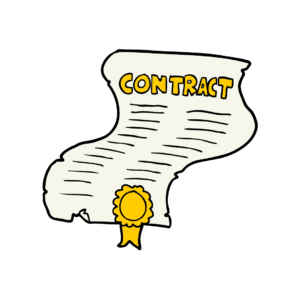We understand that disputes can be crippling for any business, both in terms of administrative time and cost; but mostly for small businesses where cash flow can be crucial. But it is also a very British thing, isn’t it? That we avoid confrontation and may often avoid issues arising with customers or suppliers who aren’t paying their invoices or are breaching a term of a contract. That may especially be the case where the other party is a more established business with greater weight, reputation or bargaining power.
strength in consistency.
Whilst we get this aversion to open warfare at Lawbox, we’d like to help our clients understand that there is strength in being consistent when it comes to dealing with these issues. Asserting your rights under a contract doesn’t have to be awkward or confrontational. By being consistent in relation to your responses to non-payment and issues arising in a contract you can improve your position. If anything, setting the boundaries (and maintaining them) can strengthen the contractual relationship because everyone knows where they stand.
resolving your disputes.
The real key to dispute resolution though is to identify and address a potential issue EARLY. This timeliness can often avoid dispute and resolve the issue without considerable time, stress and expense.
8 ways to avoid disputes.
To help you and your business to avoid costly disputes and disagreements we have compiled a list of key actions you should undertake:
1. HAVE A PROPER CONTRACT IN PLACE.
This may seem obvious but many businesses in their infancy conduct relationships with clients, suppliers, and other businesses without a clear contract. By ensuring the main terms (and any amendments) of your relationship are recorded and understood by both parties you can avoid dispute. Always know your risks; payment terms and payment procedures and (most importantly) your remedies!
2. KNOW YOUR CONTRACT.
So, you have a contract in place but do you know exactly what is to be provided either in terms of goods and services? Knowing your contract inside and out and making sure that it records the scope of work or services clearly and in as much detail as possible can also avoid disputes. Remove any grey areas and uncertainty (or room for argument) about what is intended to be done and, importantly, remember to record any change in services and any changes in timescales and costs.
3. AGREE ON CLEAR TIMESCALES.
When is the work to be completed or goods to be delivered? If you are required to comply with a deadline and you cannot achieve it, speak to the other party and agree to a revised timeline; or agree on terms from the outset about what should happen if there is a delay. Don’t pretend an issue doesn’t exist, hoping it will go away or sort itself out! It is easier to address possible delays in advance, rather than after they have started to occur.
4. KEEP TRACK OF PAYMENTS TO BE MADE.
If a payment is late, chase it. Contracts often contain interest clauses or other remedies for when payment is not made on time, but often businesses are reluctant (or even embarrassed) to rely on them. But don’t forget – it’s a commercial world – if parties agree on terms, don’t be afraid to use them!
5. KEEP FULL AND DETAILED RECORDS.
Keep correspondence (including text messages and emails), as well as records of meetings, telephone discussions, or other communications plus documents such as quotations, tenders, etc. Whilst most of the time this information won’t be required, it will assist you in supporting your position about what was agreed in the event of an issue arising. Remember, if you were to bring a claim, the onus will be on you to prove your position. Also, as a worst-case scenario, in any formal litigation process, you would be required to preserve all relevant documents – so don’t throw anything away.
6. STAY IN TOUCH.
Manage your relationship from the outset. Don’t be afraid to ask for monthly or weekly catch-up meetings to help ensure everything stays on track in relation to the agreed services, works or supply of goods.
7. ENSURE YOUR BUSINESS IS ALIGNED INTERNALLY.
This one is important for many, many reasons, not just to avoid disputes!
Don’t work in silos and ensure that where more than one person in your team is working with the business, with whom you have a bubbling issue, you are all communicating the same message. There is nothing that will undermine your position more than where you and your colleagues are saying different things.
8. DON’T BURY YOUR HEAD IN THE SAND!
As we already mentioned – an issue won’t go away just because you ignore it. If anything, you know it will get worse. As soon as you notice an issue, deal with it or take advice on it.
already beyond the point of no return?
If you find yourself in a situation where you haven’t taken these actions and need some help getting on track, or you’ve taken them but still find yourself in a potential dispute with a client or another business that needs to be resolved then this is where we can help! If you are generally concerned about how to manage a contractual relationship to avoid disputes then get in touch at onwards@lawboxlegal.com.
